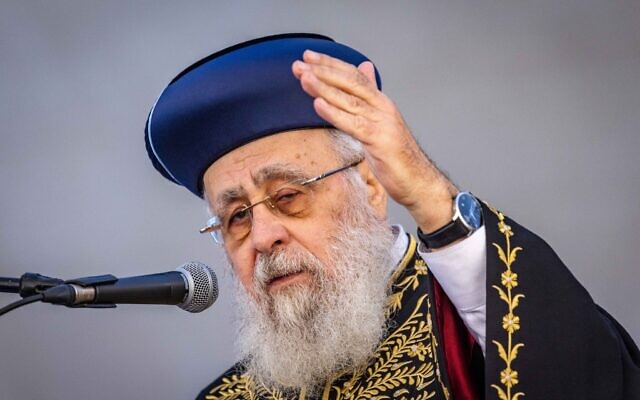A coalition deal between the far-right Religious Zionism party and Likud reportedly includes a clause that would move control of the office of the military’s chief rabbi from the Israel Defense Forces to the Chief Rabbinate of Israel.
According to Hebrew-language media reports over the weekend, the agreement says the incoming government would advance a bill aimed at “strengthening the status of the military rabbi.”
The bill would give the Chief Rabbinate control over the appointment process for the IDF chief rabbi. Currently, the IDF chief rabbi, a brigadier general, is appointed by the IDF chief of staff.
The appointment would reportedly be made by a committee headed by the Sephardic chief rabbi and composed of government representatives, a head of a yeshiva, the head of the IDF’s Personnel Directorate, and a former IDF chief rabbi, among others.
Additionally, the bill would reportedly stipulate that the IDF chief rabbi will be subject to the halachic — Jewish law — rulings of the Chief Rabbinate.
The Military Rabbinate and Chief Rabbinate currently clash on several halachic topics, such as conversion to Judaism, women serving in the IDF, violating laws of the Sabbath for operational needs, and burial of non-Jewish fallen troops.

Sephardic Chief Rabbi Yitzhak Yosef speaks at the National Headquarters of the Israel Police in Jerusalem on September 22, 2022. (Olivier Fitoussi/Flash90)
Another part of the bill would reportedly raise the IDF chief rabbi’s rank to major general. The move would ensure that the IDF chief rabbi can always participate in meetings of the IDF’s General Staff Forum, reserved for major generals and the IDF chief of staff.
The IDF chief rabbi was historically a major general, but in 2000 the rank was lowered to brigadier general. The tenure is typically five years, but is often extended to six or more.
Former IDF chief of staff Gadi Eisenkot slammed the planned bill, saying it would be bad for the army. “Faced with security challenges, we do not have the privilege of turning the IDF into a bargaining chip in coalition negotiations,” Eisenkot, a Knesset member for the center-right National Union party, told the Kan public broadcaster on Friday.
The modern Orthodox nonprofit group Ne’emanei Torah Va’Avodah also condemned the plan, saying in a statement Sunday it would “lead to the politicization of the military rabbinate and damage the military chain of command.”
“A military rabbi is a profession that requires expertise, military experience, and familiarity with the needs of the system and its special halachic areas,” it said. “Moreover, it is unthinkable for rabbis whose sons do not serve in the IDF to issue rulings on Jewish law for those who do serve.”

Likud leader MK Benjamin Netanyahu (left) speaks with Religious Zionism party head MK Bezalel Smotrich during a vote in the Knesset, December 20, 2022. (Yonatan Sindel/Flash90)
The IDF chief rabbi bill is the latest in a series of planned moves by the incoming government to change the control politicians have over the military.
Bezalel Smotrich, who leads the far-right Religious Zionism party, is set to be given a new independent office within the Defense Ministry to oversee areas of the West Bank fully controlled by Israel, known as Area C.
Smotrich will be able to appoint the generals leading the hybrid civil-military Coordinator for Government Activities in the Territories and its office overseeing many settlement issues, the Civil Administration, with Prime Minister-designate Benjamin Netanyahu’s approval.
Currently, the major general in charge of COGAT is appointed by the defense minister at the recommendation of the IDF chief of staff, and the brigadier general overseeing the Civil Administration is appointed by the IDF chief of staff.
In addition, far-rןght Otzma Yehudit leader Itamar Ben Gvir, who is set to become the minister in charge of police, will take control of the West Bank Border Police. The unit is currently subordinate to the army and Defense Ministry.
Netanyahu announced Wednesday night that he had succeeded in forming a coalition with the far-right Otzma Yehudit, Religious Zionism and Noam, and his long-time ultra-Orthodox partners Shas and UTJ, which together won 64 seats in the 120-seat Knesset in November’s election.
However, full coalition deals have yet to be signed by the parties, with several outstanding issues remaining.
Read More:Incoming coalition reportedly to give Chief Rabbinate control over IDF’s chief rabbi
2022-12-25 11:32:26

